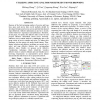146
click to vote
TMM
2010
14 years 8 months ago
2010
Communication between humans deeply relies on the capability of expressing and recognizing feelings. For this reason, research on human-machine interaction needs to focus on the re...
121
click to vote
INTERSPEECH
2010
14 years 9 months ago
2010
We carry out two studies on affective state modeling for communication settings that involve unilateral intent on the part of one participant (the evoker) to shift the affective s...
124
click to vote
CONNECTION
2010
14 years 11 months ago
2010
Abstract. Despite the great amount of knowledge produced by the neuroscientific literature affective phenomena, current models tackling noncognitive aspects of behavior are often b...
122
click to vote
ICIP
2009
IEEE
14 years 11 months ago
2009
IEEE
Because of the fast increasing number of movies and long time span each movie lasts, novel methods should be developed to help users browse movies and find their desired clips eff...
113
click to vote
TSD
2010
Springer
14 years 12 months ago
2010
Springer
In this paper we present our study on expressive gibberish speech synthesis as a means for affective communication between computing devices, such as a robot or an avatar, and thei...
107
Voted
TROB
2008
15 years 2 months ago
2008
Abstract--Investigation into robot-assisted intervention for children with autism spectrum disorder (ASD) has gained momentum in recent years. Therapists involved in interventions ...
124
click to vote
IJMMS
2007
15 years 2 months ago
2007
Affective reasoning plays an increasingly important role in cognitive accounts of social interaction. Humans continuously assess one another's situational context, modify the...
139
click to vote
IJMMS
2007
15 years 2 months ago
2007
How we design and evaluate for emotions depends crucially on what we take emotions to be. In affective computing, affect is often taken to be another kind of information - discret...
140
click to vote
IWC
2006
15 years 2 months ago
2006
Conveyance and recognition of human emotion and affective expression is influenced by many factors, including culture. Within the user modeling field, it has become increasingly n...
124
click to vote
IJMMS
2008
15 years 2 months ago
2008
Generally, an experienced therapist continuously monitors the affective cues of the children with Autism Spectrum Disorders (ASD) and adjusts the course of the intervention accord...




